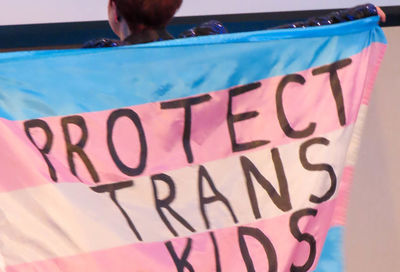D.C. theaters will require proof of vaccination for live performances
An unprecedented display of unity among more than a dozen D.C. area theaters is intended to protect performers, staff, and patrons.

In an unprecedented display of unity, 14 theaters in the D.C. area have announced that they will require audiences to show proof of vaccination in order to attend performances.
The theaters include Arena Stage, the Atlas Performing Arts Center, Constellation Theatre Company, GALA Hispanic Theatre, The Keegan Theatre, Mosaic Theater Company, Round House, Shakespeare Theatre Company, Signature Theatre, Studio Theatre, Synetic Theater, Theater J, and Woolly Mammoth Theatre Company, with more expected to join in the coming weeks.
(Since this article was published, the following theaters have joined the coalition requiring proof of vaccination: Anacostia Playhouse, MetroStage, Perisphere Theater, Peter’s Alley, Scena Theatre, Spooky Action Theater, Unexpected Stage, Washington Improv Theater, Washington Stage Guild, and We Happy Few Productions.)
“I think setting a collaborative policy really helped all of us say, ‘Yes, this is the right thing to do, we need to do this, and let’s do this together,’” says Chris Jennings, Executive Director of The Shakespeare Theatre Company.
Jennings points out that “our audiences go from theater to theater. And we wanted some consistency between what audiences could expect coming back into live theater and what they could expect from theater to theater…. We’ve all suffered over the past 17 months and we want theater to come back and we don’t want any setbacks. We need to do it safely.”
“We are part of a very compassionate, empathetic industry,” says Amy Austin, President and CEO of TheatreWashington, an alliance of theatrical organizations and independent theater artists. “Making sure that the audience knows that we’re going to put safety protocols in place is really at the root of it — that audiences understand what’s in place for them and what the experience is going to be like.”
Austin doesn’t view the upcoming season as a comeback for the theater community.
“Theaters have been producing and creating all sorts of things during this entire time,” she says. “So coming back is not how I would describe it. I think that what we are looking forward to is being able to gather fully together. But we have been gathering in virtual spaces. We have been gathering outdoors, to some extent. The activity, the creation, never stopped. And so what we hope to return to is getting back into the theater spaces again.”
Which is where the vaccine requirements come into play, as it helps remove one of the fundamental concerns audience members may have while attending an indoor production. “The pandemic isn’t over,” says Austin. “We will continue to go through this. But with the vaccination rate getting higher, there’s more opportunity to gather.”
Proof of vaccination will be required for all live, indoor public performances through Dec. 2021, although that date will be reviewed in October. Such proof can include a physical vaccination card, or other options depending on individual theater policies.
For patrons to be considered fully vaccinated, they must attend performances at least 14 days after receiving a double-dose vaccine such as Pfizer, or 14 days after a single-dose vaccine such as Johnson & Johnson.
Exemptions will be made for children under the age of 12, those with medical conditions preventing vaccination, and those whose religious beliefs prevent vaccination. Such patrons will be required to bring proof of a timely negative COVID-19 test — although that time will depend on individual venues.
Larger venues, meanwhile, such as the multi-staged Kennedy Center, have not yet announced a definitive plan, as they’re still working out details of their own policies on a much larger, more complicated scale.
“We fully support the work being done by institutions in D.C. and across the country as we return to full-capacity, indoor performances,” read a statement from the nation’s foremost performing arts institution. “The Kennedy Center is a complex organization, with many stakeholders across our roles as a performing arts center, presidential memorial, and federal building. We are working with our numerous constituencies on updated protocols and look forward to sharing that information soon, as the safety and comfort of our audiences, artists, staff, and volunteers remains our highest priority.”
Jennings, meanwhile, is counting the days until the Shakespeare Theatre Company reopens its doors at both Sidney Harman Hall on F Street and The Michael R. Klein Theater (formerly The Lansburgh) on 7th in downtown Washington.
“I’m so looking forward to returning,” he says. “It was just last week that I was welcoming back a number of our staff who had been on furlough. And they’re all coming back helping us gear up for the season.”
Austin expects more theaters to join the coalition over the coming weeks. “You’re going to see a lot of variance because it’s a really big community,” she says. “But I feel really confident. It’s a very compassionate and caring community and they will do everything they can to keep audiences safe.”
For further information on the vaccination requirement and specific policies for all participating venues, visit TheatreWashington.org.
Support Metro Weekly’s Journalism
These are challenging times for news organizations. And yet it’s crucial we stay active and provide vital resources and information to both our local readers and the world. So won’t you please take a moment and consider supporting Metro Weekly with a membership? For as little as $5 a month, you can help ensure Metro Weekly magazine and MetroWeekly.com remain free, viable resources as we provide the best, most diverse, culturally-resonant LGBTQ coverage in both the D.C. region and around the world. Memberships come with exclusive perks and discounts, your own personal digital delivery of each week’s magazine (and an archive), access to our Member's Lounge when it launches this fall, and exclusive members-only items like Metro Weekly Membership Mugs and Tote Bags! Check out all our membership levels here and please join us today!























You must be logged in to post a comment.